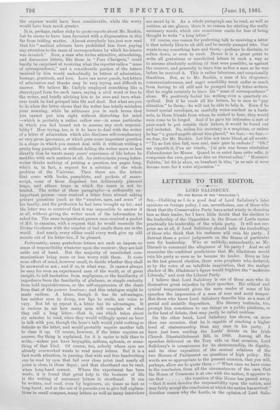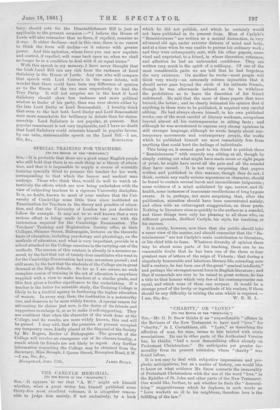LETTERS TO THE EDITOR.
LORD SALISBURY.
CT° THE EDITOR OF THE " EPEOTATOR1 SI11,—Disliking as I do a good deal of Lord Salisbury's later opinions on foreign policy, I am, nevertheless, one of those who think that the Conservative Party have acted wisely in choosing him as their leader, for I have little doubt that his election to the leadership of the Opposition in the House of Lords means practically his leadership of the whole party. It will not sur- prise me at all, if Lord Salisbury should belie the forebodings of those who think that his rashness will ruin his party. I distrust these a priori judgments on the fitness of particular men for leadership. Who so unlikely, antecedently, as Mr. Disraeli to command the allegiance of his party P And we all remember the confident predictions that Mr. Gladstone would ruin his party as soon as he became its leader. Even as late as the last general election, there were prophets who declared, as by the voice of an infallible inspiration, that the malign shadow of Mr. Gladstone's figure would frighten the" moderate Liberals," and rout the Liberal Party.
I believe that Lord Salisbury is one of those men who do themselves great injustice by their speeches. His critical and cynical temperament gives the mere reader of some of his speeches the impression of a man of sour and acrid temper. But those who know Lord Salisbury describe him as a man of genial and amiable disposition. His literary instincts, too, prompt him sometimes to say things on a public platform, or in the heat of debate, that may justly be called reckless.
On the other hand, Lord Salisbury has shown, on more than one occasion, that he is capable of reaching a higher level of statesmanship than any man in his party. I have just been reading the Lords' debate on the Irish Church Disestablishment Bill, in 1809. Among all the speeches delivered on the Tory side on that occasion, Lord Salisbury's is conspicuous for its statesmanship, its dignity, and its clear exposition of the mutual relations of the two Houses of Parliament on questions of high policy. His words are so appropriate to the present occasion, that you will, perhaps, allow me to quote them :—" When once we have come
to the conclusion, from all the circumstances of the case, that the House of Commons is at one with the nation, it appears to
me that the vocation of this House has passed away, —that it must devolve the responsibility upon the nation, and may fairly accept the conclusion at which the nation has arrived." Another reason why the Lords, in the opinion of Lord Salis- bury, should vote for the Disestablishment Bill is just as applicable to the present occasion :—" I believe the House of Lords will also remember that no force, if repelled, remains as it was. It either declines—and in this case, there is no reason to think the force will decline—or it returns with greater power. And this agitation, whose force you can now regulate and control, if repelled, will come back upon us, when we shall no longer be in a condition to deal with it on equal terms."
With this speech in my memory, I have never thought that the Irish Laud Bill ran any risk from the rashness of Lord Salisbury in the House of Lords. Any one who will compare that speech with Lord Cairns's in the same debate, will wonder that there could have been any difference of opinion as to the fitness of the two men respectively to lead the Tory Party. It will not surprise me in the least if Lord Salisbury should show less rashness and more political wisdom as leader of his party, than was ever shown either by the late Lord Derby or Lord Beaconsfield. I humbly think that even to the last both Lord Derby and Lord Beaconsfield were more remarkable for brilliancy in debate than for states- manship. Lord Salisbury is not popular, at present. But popular resentment is not very implacable, and I have no doubt that Lord Salisbury could reinstate himself in popular favour, by one calm, statesmanlike speech on the Laud Bill.—I am,

































 Previous page
Previous page